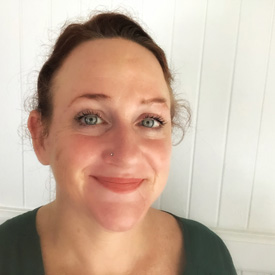by Meriah Nichols

Wrapping up February and thinking of all the love that seems to drench this month, what with the love that seems to fill this month, rotating as it does around Valentine’s Day. Heart-shaped boxes of candy, flowers and stuffed creatures are on display all over mainstream culture; the message of love is strong. Not just the message of love though; it’s the message of romantic love.
We have romantic love in the disability community, of course. We have our partners, lovers – the people to whom we connect with physically and hopefully emotionally. We also have familial love – the love we feel and express with our families. This love can be for our children, siblings, parents, extended family. But we also have the love that is expressed in care.
“Care work” is a concept of which Leah Lakshmi Piepzna-Samarasinha talks about in her book, “Care Work: Dreaming Disability Justice” She writes of disabled “care webs,” in which we form webs that support, care and empathize with each other. In which we can bring our whole authentic selves to the table and know we’ll be okay. She also talks about love being something that all of us disabled people deserve. She writes, “we all deserve love. Love as an action verb. Love in full inclusion, in centrality, in not being forgotten. Being loved for our disabilities, our weirdness, not despite them. Love in action is when we strategize to create cross-disability access spaces. When we refuse to abandon each other. When we, as disabled people, fight for the access needs of sibling crips.”
Mia Mingus also delves into access as a form of love with “access intimacy.” She writes, “access intimacy is that elusive, hard to describe feeling when someone else “gets” your access needs. The kind of eerie comfort that your disabled self feels with someone on a purely access level. Sometimes it can happen with complete strangers, disabled or not, or sometimes it can be built over years. It could also be the way your body relaxes and opens up with someone when all your access needs are being met.”
She also writes, “access intimacy is not just the action of access or “helping” someone. We have all experienced access that has left us feeling like a burden, violated or just plain shitty. Many of us have experienced obligatory access where there is no intimacy, just a stoic counting down of the seconds until it is over. This is not access intimacy.”
Mia goes on to say, “access intimacy is not charity, resentfulness enacted, intimidation, a humiliating trade for survival or an ego boost. In fact, all of this threatens and kills access intimacy. There is a good feeling after and while you are experiencing access intimacy. It is a freeing, light, loving feeling. It brings the people who are a part of it closer; it builds and deepens connection. Sometimes access intimacy doesn’t even mean that everything is 100% accessible. Sometimes it looks like both of you trying to create access as hard as you can with no avail in an ableist world. Sometimes it is someone just sitting and holding your hand while you both stare back at an inaccessible world.”
These perspectives speak deeply to many of us in the disability community. They speak to us because they remind us of the many types of love that exist, they remind us of the exquisite joy that comes when we are seen and accepted, when our access needs are understood. They remind us of what relief feels like, when we take our masks off, or can relax in the web of care that our disabled community understands.
Love, as Hallmark tells us, is a heart-shaped box of chocolate. Love, as Leah and Mia tell us, is active, expressive – it’s a recognition and an understanding, a form of justice.
More information:
Care Work: Dreaming Disability Justice: Amazon – https://amzn.to/3IzZ7to, pg. 76, 77
Alice Wong’s interview with Leah Lakshmi Piepzna-Samarasinha on the Disability Visibility Project: https://disabilityvisibilityproject.com/2019/04/07/ep-48-care-work/
Access Intimacy: The Missing Link, by Mia Mingus: https://leavingevidence.wordpress.com/2011/05/05/access-intimacy-the-missing-link/
 Meriah Hudson Nichols is originally from a sheep ranch in Cloverdale, California, but grew up in countries around the Pacific Basin. She studied education, human resource development, training, and project management and spent over twenty years in careers with connections with her degrees. As a deaf woman, mother of a child with Down syndrome and daughter of a woman with fibromyalgia, she is passionate about disability rights, education and employment. In her spare time she writes, takes photos, paints and travels.
Meriah Hudson Nichols is originally from a sheep ranch in Cloverdale, California, but grew up in countries around the Pacific Basin. She studied education, human resource development, training, and project management and spent over twenty years in careers with connections with her degrees. As a deaf woman, mother of a child with Down syndrome and daughter of a woman with fibromyalgia, she is passionate about disability rights, education and employment. In her spare time she writes, takes photos, paints and travels.
